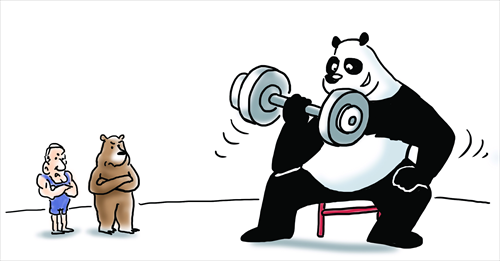HOME >> OP-ED
Russian suspicions of China hold back ties
By Han Kedi Source:Global Times Published: 2016/7/24 19:18:00

Illustration: Liu Rui/GT
The Sino-Russian relationship has been progressing smoothly in recent years. Both countries have shared similar stances over several international issues. They are in the trenches together in terms of how to manage global cyberspace, maintain the stability of the international community and protect the authority of international law. China values a strategic relationship with Russia, its biggest neighbor, because China's foreign policy stresses good neighborliness, and both countries share common interests in energy cooperation and many regional issues such as the North Korean nuclear crisis and Central Asian security. The global geopolitical architecture will be more balanced with a closer Sino-Russian relationship.However, the improving bilateral relationship is also being challenged by many problems within. The various cooperation mechanisms between the two countries are actually very inefficient. Some political forces in Russia still harbor doubts about cooperation with China. There is overt support for thoughts and theories such as the China Threat and Yellow Peril in Russia. The Russian authorities also lack delicacy in dealing with some of its China policies, giving too little care to the interests of the Chinese and the big picture of the bilateral relationship.
After all, there is a lack of strategic mutual trust between China and Russia, and the latter, like the US, is on guard in face of China's rapid rise.
Eurocentrism is deeply rooted among Russian elites. This mind-set cannot be changed in a short term. What's more, the Russians are always anxious about gains and losses in particular dealings with China, about whom they seem to have bred a victimhood, believing they are in a less advantageous position in almost every deal with China. Some Russians believe that with the US rebalance to the Asia-Pacific and treating China as its arch rival, Russia will have more strategic room. Japan and Europe need Russia's energy, and China needs Russia's energy and weapons, while the US and Japan need Russia's cooperation to contain China's rise. It hopes that not only Beijing, but Western powerhouses and their organizations, will have to court Moscow.
Russia's consistent accusation that US practices hegemony and intervention in other countries' internal affairs is right but blemished by ulterior motives. What Russia condemns the US for is actually what Russia wants to do. Moscow wants to regain its superpower status, pursues hegemony and instigates its own color revolutions. Russia's plan is to denounce US-led rules and build Russia-led rules.
Russia has always been trying to dominate the process of political affairs concerning Eurasia. It wants to assume leadership in the Eurasian Economic Union and the Shanghai Cooperation Organization. Some Russians are worried that China might infiltrate Russia's "backyard," Central Asia. They have vilified normal business competition between Chinese and Russian companies in Central Asia as a game between two major powers.
Russia brought tremendous harm to China in the 19th and early 20th centuries. However, few Russians, from normal people to policymakers and experts, admit this history. Even during and after WWII, the Soviet Union traded on China's dilemma to solidify its administration over seized land and refused to return it to China.
Russia is also aiming at its own containment of China by using India, a key force in Russia's eyes. Fostering another regional power to offset China's growing influence is what both Russia and the US desire. India's ambition to join the Nuclear Suppliers Group, which was foiled by some countries including China, was backed by both Russia and the US.
Washington and Moscow also have a common ground in the South China Sea dispute. In the Russia-ASEAN Sochi Summit in May, a joint statement emphasized the importance of protecting freedom of navigation in the South China Sea, using rhetoric similar to that of the US and Japan.
China's diplomacy has its own problems. Lacking confidence, Beijing always tries to solicit and depend on international support to defend itself. Take the South China Sea dispute. China should have avoided seeking other countries' support for its claim, while protesting an internationalization of the dispute, China is internationalizing it itself.
Sino-Russian relations are important, but should not be exaggerated. China should keep in mind that some supporters won't make much difference in face of outside pressure. China's national security and sovereign integrity do not depend on diplomacy, but on good governance and its people's support.
The author is an associate research fellow at the Institute of Russian, East European and Central Asian Studies, Chinese Academy of Social Sciences. opinion@globaltimes.com.cn
Posted in: Viewpoint